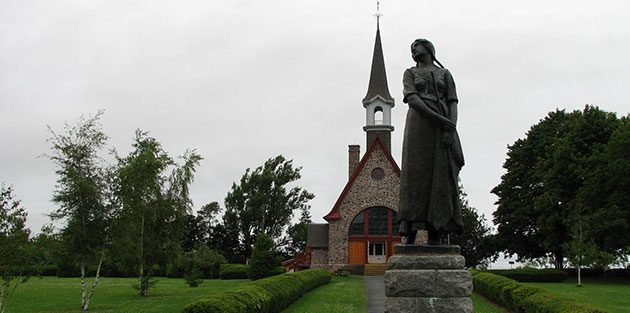Evangeline Wanders by Sarah Skwire
Hardly anyone reads Longfellow anymore, but maybe we should.
Henry Wadsworth Longfellow. Evangeline. 1847. 64 pages.
Nobody reads Longfellow anymore, except perhaps students at Bowdoin College, where Longfellow was a student and later a librarian and professor. But Longfellow’s poetry used to be read and recited everywhere. Memorizing it was a common exercise for school children. And you probably know a few lines of some of his poems, though you may not know they are his.
Listen my children and you shall hear
Of the midnight ride of Paul Revere
and
Under the spreading chestnut tree
The village smithy stands
and
Christ save us all from a death like this
On the reef of Norman’s woe!
Longfellow’s epic Evangeline was, according to my grandmother, one of my grandfather’s favorite books when he was a young man, and—for poetry—it sold like hotcakes when it first came out. Nearly 36,000 copies sold in the first decade after publication.
But nobody reads Longfellow anymore. So I thought I’d have a look at Evangeline, and see what it might have to offer readers of this column.
Certainly the story’s bare outline is promising ground for thinking about liberty. Evangeline tells the story of two young lovers separated by the expulsion of the Acadian people from Canada’s maritime provinces to the colonies and, in some cases, to France. (Later, some of the Acadians relocated to Louisiana and became known as Cajuns. The Longfellow reference is probably why, in The Princess and the Frog, the celestial beloved of the Cajun firefly Ray is named Evangeline.)
Modern scholars have rightly noted some of the historical problems with Longfellow’s poem. He absolves the American colonists of any blame for the expulsion in order to make King George more of a villain, constructs an ahistorically homogenous Acadian culture, and is often insensitive to the Native Americans he describes, for example. But Longfellow’s tale of expulsion, displacement, and the search for lost family, lost love, lost culture, and a place of refuge remains moving today. In fact, our contemporary awareness of such injustices as the forced relocation of Native American nations on the Trail of Tears and the signing of Executive Order 9066, which imprisoned Japanese Americans and stripped them of their property, should bring additional meaning and pathos to the poem.
From the poem’s opening words, “This is the forest primeval,” Longfellow situates the soon-to-be-destroyed Acadian culture in a timeless, golden world marked by peace and equality.
Thus dwelt together in love these simple Acadian farmers,—
Dwelt in the love of God and of man. Alike were they free from
Fear, that reigns with the tyrant, and envy, the vice of republics.
Neither locks had they to their doors, nor bars to their windows;
But their dwellings were open as day and the hearts of their owners;
There the richest was poor, and the poorest lived in abundance.
Longfellow claims later that the Acadians held all things in common, but the characters in the poem clearly possess private property, and one is designated as “the wealthiest farmer of Grand-Pre.” Like the above passage, that claim about common property is, I think, intended to accent the peaceful accord of the culture and the way its world runs easily and regularly, with a time and a place for everything, and no strife among the Acadians.
But all is not well. As the village of Grand-Pre prepares to celebrate the betrothal of Evangeline (the loveliest maiden in the village) and Gabriel (the best of the village’s young men), their fathers and fathers’ friends are worrying about the intentions of the armed English ships anchored near their harbor. The presence of the ships and their implicit threat has the men of the village debating questions of justice and power. The blacksmith argues:
“Daily injustice is done, and might is the right of the strongest!”
But, without heeding his warmth, continued the notary public,—
“Man is unjust, but God is just; and finally justice
Triumphs”
When the men of the village are called to the church to hear a proclamation from King George, the blacksmith certainly seems to have been correct in his concerns. The leader of the English troops announces:
To my natural make and my temper
Painful the task is I do, which to you I know must be grievous.
Yet must I bow and obey, and deliver the will of our monarch;
Namely, that all your lands, and dwellings, and cattle of all kinds
Forfeited be to the crown; and that you yourselves from this province
Be transported to other lands. God grant you may dwell there
Ever as faithful subjects, a happy and peaceable people!
Prisoners now I declare you; for such is his Majesty’s pleasure!”
It is a credit to the apparent simplicity and to the precision and conciseness of Longfellow’s verse that we can read this announcement a time or two without noting the depth of its horror. Bad enough that the land and homes and animals of the Acadians are, with a few brief words, stripped away and taken for the crown. Bad enough that they are transported to other unspecified lands. But they are also expected to remain happy, peaceful, and faithful subjects of the king who has done this to them. It is his pleasure to make them prisoners. He requires that it be their pleasure as well.
The blacksmith tries to rebel, but is rapidly subdued by the armed soldiers. The Acadian men are locked into the church until the village can be transported, and in the transportation Evangeline is separated from her betrothed. The remainder of the poem is the story of her lifelong search for him and their tragic reunion when she—now a nun—is called to nurse him on his deathbed.
At one point during her wanderings, Evangeline finds some of the resettled Acadians in Louisiana. She sees the culture in the process of rebuilding itself, and is told:
Here, too, numberless herds run wild and unclaimed in the prairies;
Here, too, lands may be had for the asking, and forests of timber
With a few blows of the axe are hewn and framed into houses.
After your houses are built, and your fields are yellow with harvests,
No King George of England shall drive you away from your homesteads,
Burning your dwellings and barns, and stealing your farms and your cattle.
And I think we are meant, as readers, to find the Acadians’ quiet rebuilding, like Evangeline’s quiet persistence and the lovers’ deathbed reunion, to be noble and comforting. I think we are meant to feel reassured that, while it may take a long time, “finally, justice/Triumphs.”
But I remain uneasy.
Given that King George has already shown his willingness to treat his subjects as his property and to relocate them for his own profit and his own purposes, and given that settlement in Louisiana puts the Acadians under the control of—at various times—the French, English, and Spanish monarchies, how secure should the Acadians really feel?
When lives and property are held at “his Majesty’s pleasure,” the blacksmith is always right. Injustice prevails, backed up by might. And Evangeline will always wander, looking for a home.
Sarah Skwire is a fellow at Liberty Fund, Inc. She is a poet and author of the writing textbook Writing with a Thesis.
EDITORS NOTE: The featured image originally appeared on the Foundation for Economic Education website and is reposted with permission.



